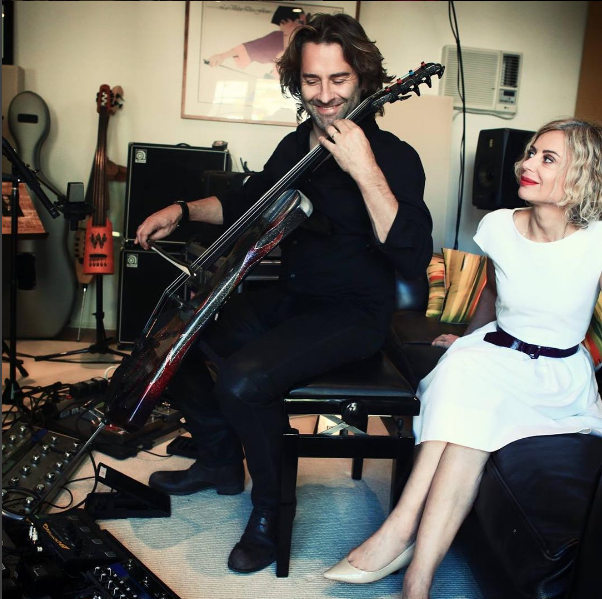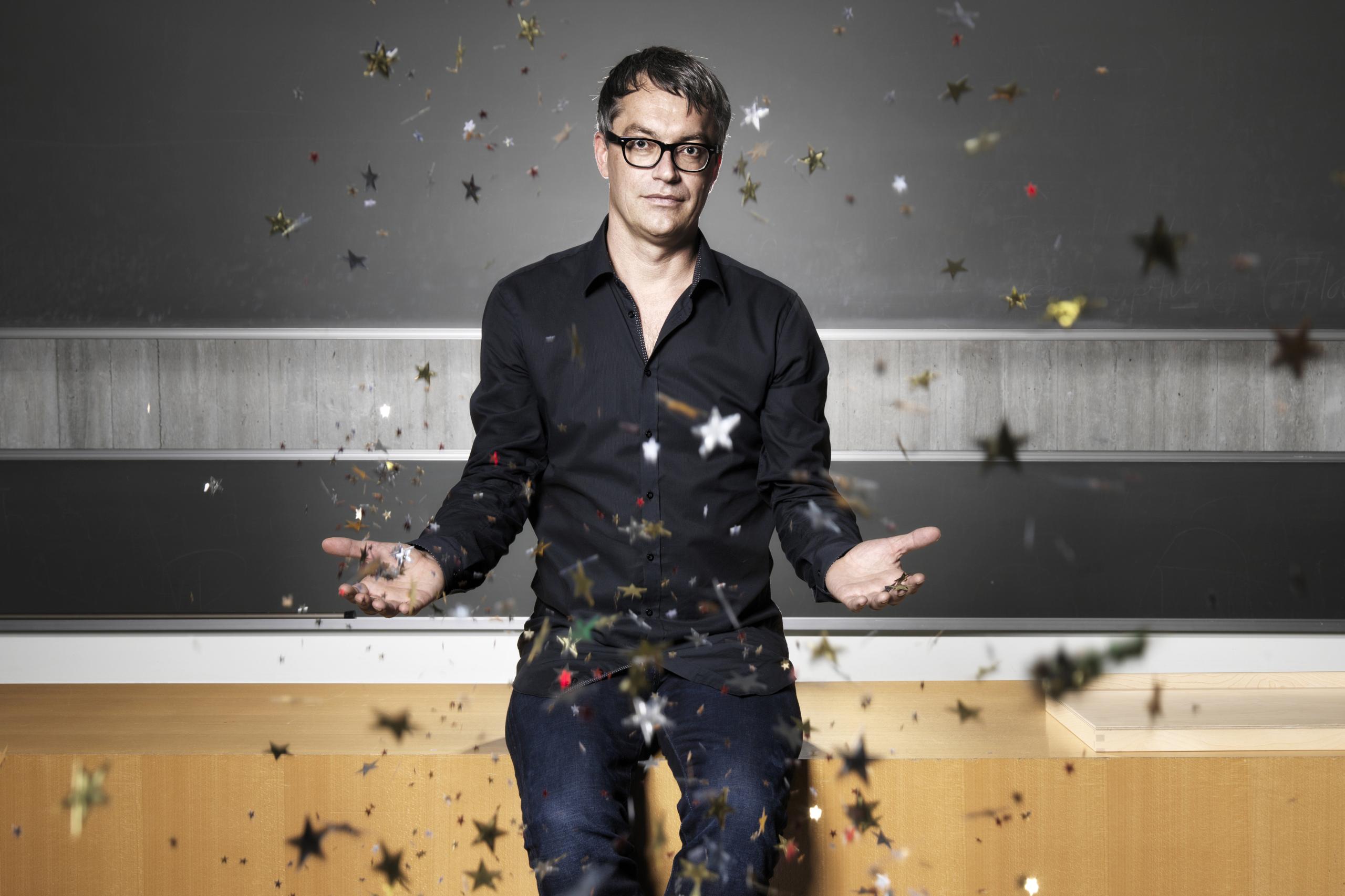Swiss cellist helps wife become ‘superhuman’

The music of Swiss cellist Martin Tillman has provided the backdrop for pirates, soldiers and comic book heroes in some of Hollywood’s biggest blockbusters. But his latest album is a tribute to a different leading lady: his wife, who inspired and helped guide it.
Following a move from Zurich to Los Angeles nearly 30 years ago, Tillman’s career took off after he met and worked with composer Hans Zimmer on films ranging from Pirates of the Caribbean to Blackhawk Down and The Dark Knight Rises. Originally trained as a classical cellist, he delved into uncharted musical genres for his instrument and now composes sweeping, atmospheric soundscapes involving global collaborations.
Perhaps none of Tillman’s work has more of his heart and soul in it than his latest album, Superhuman. He composed it as a tribute to his wife Eva, who suffers from Multiple Sclerosis.
Eva describes the album as the ultimate collaboration that began when she asked him to write her “a happy tune” for her birthday. It grew from there, into a full album that she says was a “healing force” for the soul and their relationship and goes beyond her illness.
“It has nothing to do with people who are sick,” she says. “I hope it also will help people who are troubled in a way, but this is a transcendental type of music. It’s going to make everybody’s day better, I hope.”
Martin Tillman spoke to swissinfo.ch about working in Hollywood, composing that album and living with one foot in the US and the other in Switzerland.
On ‘making it big’ in LA
The difficult part for me was the transition from the straight classical player to getting involved in rock and roll. You can’t just kind of take out an ad in the newspaper saying ‘by the way, I want to join a band, I want to play the cello’. Somebody said to me, ‘you need to start from scratch, why don’t you start as a receptionist in a recording studio? Then you can meet recorders and artists’. So I got a job and got paid $4.50 an hour, under the table because I was illegal. I had to make coffee and drive producers’ clothes to the dry cleaner. I did that for some pretty incredible people, and in three years I met a bunch of really excellent producers. One thing led to another, and I got to meet more and more bands. But it took four or five years to really get involved.
On the cello’s changing role in music
Today, there are many more young, talented cello players who are also multi-instrumentalists. It’s being used on many more occasions than it used to be and people started rocking out, adding effects, what I did 24 years ago. And it is great to see that the cello has become part of the element of a band, it’s no longer an odd ethnic instrument where people think, there is a classical player, he has no idea what he is doing.
On how the film recording industry has changed in 25 years
When you take away the money, things change drastically. There used to be way bigger budgets and on a big movie you could record for 15 days, every day with a full orchestra. Now money is so tight that you can probably spend a day or two on it. Most recordings are happening in other countries, so you’re basically paying the musicians flat fees and that’s it. It’s totally outsourced.
Recordings and samplings have been used more and more, on a lot of projects you don’t hear real musicians anymore. In 10 years, my session work has dropped by about 80%. I’m still happy to be working [in film] a little bit, it’s not my main goal anymore. But a lot of my friends are out of jobs, which is really sad.
On what it was like to compose his latest album, ‘Superhuman’, for his wife after she was diagnosed with Multiple Sclerosis
The feeling came from desperation, sadness, the shock of the diagnosis and from her being gradually weakened over the years, and I knew I wanted to write an album that helped her to not feel hopeless, and to empower her with the sounds.
The main goal was really to have something powerful, I didn’t want anything sad or melancholy. I wanted something strong to make the listener fly and have visual imagination. I also pictured doing something for a big venue like the Hollywood Bowl or an amphitheatre where you use massive and expansive sounds to make it into film music without the film.
Right now I just have one dream, and that’s a European tour of concert halls with Superhuman, starting in Zurich with the Tonhalle. Then it would go to several countries around Switzerland as well, with a full symphony and a crazy multimedia presentation with a band.
On creating the ‘sound cocktail’ heard on Superhuman
I had the most incredible band, probably the best session players you can get. Combined, they have played with Frank Zappa, Sting, Phil Collins, two of them played on Michael Jackson’s Thriller. So I had this whole world of musicians who spanned the history of rock and roll. On the other hand, I had an orchestra in Prague with over 30 cellists playing on seven of the tracks. I also tend to produce a lot of my own sounds at home, a lot of the piano, drum sounds and rhythmic patterns. So it was a beautiful combination of live players, programmed music and live orchestra.
PLACEHOLDER
On missing Switzerland while in LA, and LA while in Switzerland
I had a home in Zurich for many years, and I love the exchange, the musically different worlds. How someone would make music on a lake in Zurich is different from in a studio in Santa Monica, and both are equally incredible.
When I’m in Los Angeles, especially in the summer, I miss the Swiss mountains and going to the hills on a bicycle. I love the lakes, the boating, sailing and swimming. I love the clean air. I miss the ease of being able to travel around by trains, bus and boat. When I’m in Switzerland and think of America, I think it’s great to be in a city that’s so vibrant. Musically and project-wise, LA is just still massive. I have an amazing home pretty close to the ocean and I get to bicycle every day all year round, and that’s pretty cool.
Which of Tillman’s tracks featured in this story did you enjoy the most? Let us know in the comments.

In compliance with the JTI standards
More: SWI swissinfo.ch certified by the Journalism Trust Initiative


You can find an overview of ongoing debates with our journalists here. Please join us!
If you want to start a conversation about a topic raised in this article or want to report factual errors, email us at english@swissinfo.ch.